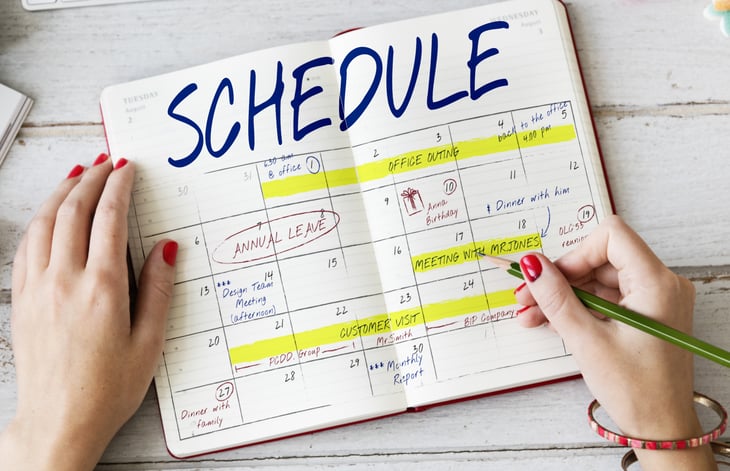
This story originally appeared on DollarSprout.
Although you might use an eight-hour workday to benchmark your productivity, research suggests workers are only productive for about three hours during that time frame.
Whether you’re working remotely or in an office, distractions pop up, and tasks that earn you money or a promotion take a back seat.
While some distractions are inevitable, they shouldn’t steal your focus from doing things that create value and help you earn money, says Grace Marshall, author of the award-winning book “How to Be Really Productive” and productivity expert at Think Productive.
According to Marshall, productivity is about managing your time, energy, and focus — so you can get work done, get money, and still have time to, well, get a life.
With that in mind, here are several ways to boost your productivity and earning potential.
1. Find your most productive hours.

There’s usually a time of day when you’re ready to do your best work, but that time of day differs for everyone. “For me, my creativity comes alive late at night, so I reserve the evenings for working on big campaign ideas and new client proposals,” says Aimee Joseph, founder of marketing boutique Brand Love Solutions. “My advice would be to determine when you’re most creative and work with it.”
To find your golden hours, listen to your body to get a sense of when you feel focused and motivated to tackle big projects. Plan your day so you’re doing the highest-priority work during your most productive hours, while routine tasks can be done when you don’t need as much concentration.
2. Figure out which office lifestyle is best for you.

Some people work best independently, while others thrive in an office setting. “In my experience, introverts really tend to enjoy working from home because they are energized by alone time,” says Alexis Haselberger, a productivity, time management and leadership coach. “Extroverts tend to have a harder time working from home for the opposite reason; they are energized through time with others.”
Have you noticed that where you work impacts your output and focus? Consider finding a job or shaping your career path based on where you can work: remotely, in an office, or a combination of the two.
3. Track and limit time spent on each task.

After a few months in the same role, you probably know how long it takes to complete your normal, routine tasks. When you need to schedule a task, allot a reasonable amount of time and aim to get it done within that time frame.
If you need help figuring out where your time goes, tools like RescueTime can help. This app automatically tracks how you spend your time, lets you set daily goals, and provides regular reports. Based on your customizations, it also limits the time spent on any task and blocks temptations like social media, notifications, and news alerts.
4. Schedule your week.

Racheal Cook, business strategist and productivity expert, says she creates a weekly Google Calendar and first blocks out time for family, friends and fun. She then blocks out major work tasks during defined hours to help create boundaries between work and her personal life. If you don’t make time for both, “then work can quickly take up every available moment in your week,” Cook says.
Blocking out time also keeps you on track and helps you to be realistic about deadlines, Haselberger says. She also decides (in advance) what time she’ll stop working each day.
5. Give yourself periodic breaks.

Working at 100% capacity at all hours just isn’t sustainable. “If you don’t take regular breaks, you risk burnout,” Haselberger says.
Some productivity methods suggest working in short bursts followed by a short break. For example, productivity-software company DeskTime says the most productive people work for 52 minutes, then break for 17 minutes. Remove yourself completely from work during this time. “A quick walk or reading an article can really reset your brain to get back into productive mode,” Haselberger says.
6. Make time for personal and career development.

“When we’re busy delivering the work that gets us the next paycheck, we react to what’s very immediate,” Marshall says. But it’s important to also think about your long-term personal and career goals and what steps it will take to get there.
Career development could include attending a training course for the next step in your career, watching a self-development seminar, or reading a book. Investing time in yourself might mean skipping billable client work now, but it boosts your earning potential over time. And focusing on personal goals can help you round out your work-life balance.
7. Avoid meetings if possible.

You’ve probably heard this workplace one-liner: “This meeting could have been an email.” While meetings can be an efficient way to collectively brainstorm ideas and create solutions, more than $37 billion per year is spent on unproductive meetings, according to one estimate. But if you must have one, Haselberger offers these tips:
- Ensure every meeting has an owner. This person schedules the meeting, sets the agenda, and facilitates the discussion.
- Only include necessary attendees. Information can be disseminated to others on a need-to-know basis via other means.
- Always have an agenda. The owner sends the agenda to all attendees. It should state the objective, items for discussion, and any relevant materials to prepare attendees.
- Define the goal for the meeting. If you don’t know what you hope to accomplish, don’t schedule a meeting.
- Decision vs. discussion. Decide whether the purpose of the meeting is for decision-making or brainstorming and discussion.
Employing a strategy will make meetings more organized and productive, and a better use of time.
8. Outsource or delegate work if you can.

Whether you’re running a business or part of a large project with co-workers, everyone has a strength and a role. Delegating or outsourcing work means “letting others do what they can do, so you can do what only you can do,” Marshall says.
For best practices, Marshall suggests communicating the results you want and defining ground rules. Although someone else will do the task differently than you would, “sometimes they’ll do it better or in a different way that still achieves the results you want,” Marshall says.
9. Avoid time wasters.

Distractions can torpedo your workday. These come in the form of household chores, co-workers or kids, and emails and notifications. “Most people check email on average 37 times a day,” Haselberger says. “Every time we are interrupted or distracted, it takes, on average, 23 minutes to refocus.”
Don’t let these derail your schedule. Instead of pausing work to tackle small tasks, you can:
- Block off time to check and answer your emails.
- Turn off notifications on all devices during work hours.
- Set communication boundaries with co-workers or household members.
- Dedicate time for chores.
Incorporating these necessary tasks into your schedule ensures that they are done while still allowing you sufficient, undistracted time to complete your larger tasks.
10. Create your own work processes.

If you’ve figured out a good way of getting things done, “let’s not reinvent the wheel,” Marshall says. Creating resources like processes, checklists, and pricing structures allows you to do the thinking and the work just once. Having the documentation will also help if you plan to grow your business in the future, Marshall says.
11. Automate tasks when possible.

In any business, repeat tasks need to get done but take up precious time. Some of these can be automated, which means using technology to speed things up. For example, instead of emailing back and forth about setting up a chat, you can use an app like TimeTrade.
Collaborating with project management tools, using accounting software, and scheduling social media posts are some other ways to automate tasks.
12. Exercise regularly.

Exercise does so much more than lower your blood pressure and help you fit into your jeans. In one study, employees who visited the gym said they were more productive, managed their time more effectively, and had smoother interactions with their colleagues. Exercise can also:
- Boost your concentration, memory, and creativity.
- Help you learn faster.
- Lower your stress levels.
Joseph says that exercising gives her a surge of creativity. When that happens, she captures ideas on her smartphone to check later. “Writing down everything is key for me, as my brain gets overloaded with ideas. Reviewing my ‘ideas dump’ later on is a great way to weed out the weak (ideas) and identify the ones with real opportunity.”
You can use voice memos or another app to record your ideas if it’s easier than stopping what you’re doing to write them down.
13. Take time to rest and recharge.

Plenty of folks work nights and weekends, take few vacations, and retire late in life. “People often think about free time as a luxury or an afterthought,” Marshall says. “But rest is fuel for productivity.” It can also improve your immune system, increase creativity, and reduce stress.
Rest will look different for everyone, but here are a few ways to make it happen:
- Block off at least one day a week where no work is allowed.
- Practice self-care, which generally means sleeping enough, eating well, and exercising.
- Take a “mental health day” if you need it.
- Make time to visit friends and family. But don’t be afraid to say “no” to social visits if you’re feeling overwhelmed.
Spending time away from work and projects is important not only because it gives you a chance to rest and recharge, but also because you might find yourself inspired or with a fresh perspective when you get back to your desk.
14. Get enough sleep.

“If we’re not feeling refreshed, it can hamper our ability to do our best work,” Marshall says. “Research suggests that if you’re sleep-deprived, the long-term cognitive impairment is equivalent to being drunk.”
According to the Centers for Disease Control and Prevention, about 1 in 3 adults don’t get enough sleep. What’s considered “enough” varies by age and person. But generally, adults should get between seven and nine hours of sleep each night, the CDC says. Here are some ways to help that happen:
- Save caffeine for the morning, and cut it from your afternoon and evening.
- Get into a consistent sleep schedule by going to sleep and waking up at the same time each day, including on weekends.
- Don’t use smartphones and other devices right before bedtime. They emit light that can mess with your circadian rhythm and ability to fall asleep.
- Avoid exercising and eating close to bedtime.
Establishing a bedtime routine and better sleep habits ensures that you’re well-rested and able to perform at your best the following day.
15. Make good food choices.

It may come as no surprise that food is directly tied to your energy level. You’ve probably grabbed a 2 p.m. snack or coffee to boost your brainpower for the afternoon. But while any food generally fuels your body, some types of food are better at promoting productivity. Here are some general guidelines:
- Have healthy food choices available. In particular, fruits and vegetables have been shown to promote curiosity, motivation, and engagement. Nuts are also a healthy option.
- Don’t skip breakfast. A meal full of protein and complex carbohydrates gives your body the energy it needs to get through the day.
- Graze. Hunger can lead to lower levels of productivity, so have a steady stream of healthy snacks on hand to eat throughout the day.
If finding ways to incorporate healthy food choices into your day is difficult, consider setting one day aside for meal prepping. It’ll not only save time and decision fatigue, but it can save you money as well.





Add a Comment
Our Policy: We welcome relevant and respectful comments in order to foster healthy and informative discussions. All other comments may be removed. Comments with links are automatically held for moderation.